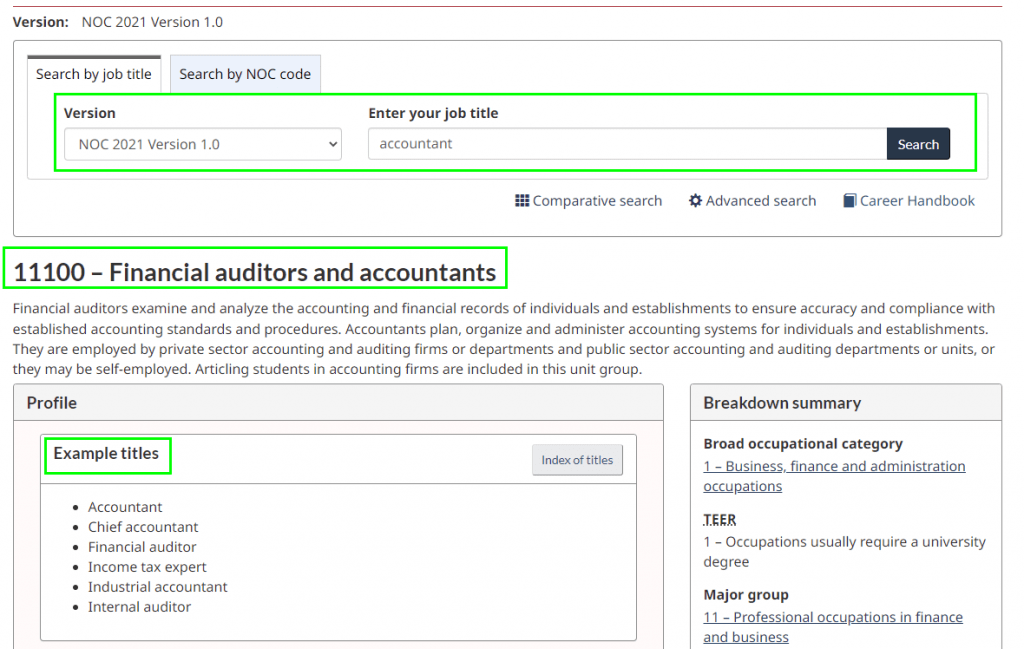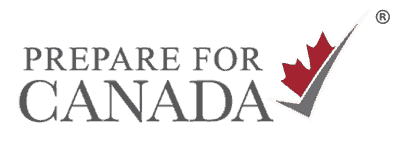
Accounting jobs are a popular career choice that employs more than 200,000 people in Canada. Prepare yourself to continue your accounting career in Canada with this helpful overview of job requirements, salaries, and job search techniques. Accountants play an essential role in helping organizations manage the financial function of their business. Currently, many companies need professionals to fill accounting jobs. So, there is a great opportunity for newcomers and internationally trained professionals.
Contents
- How to Immigrate to Canada as an Accountant
- What to Expect When Pursuing an Accounting Career in Canada
- Requirements to Continue Your Accounting Career in Canada
- Upgrading Your Skills to Meet Accounting Job Requirements
- Bridging Programs for Accounting Careers in Canada
- Accounting Schools in Canada
- Accounting Associations in Canada
- How Much Do Accountants Make in Canada?
- Accounting Salary in Canada
- Best Cities to Work in Canada Based on Accounting Salary & Lifestyle
- Pursuing an Accounting Career in Canada
- How to Find Your First Accounting Job in Canada
How to Immigrate to Canada as an Accountant
Accounting is a professional career that requires certification. Accounting job requirements in Canada for chartered professional accountants (CPA), and chartered accountants (CA) require a university degree. Also, you must complete a professional training program approved by a provincial Institute of Chartered Accountants. Some provinces will also require either two years or 30 months of on-the-job training and membership in a provincial Institute of Chartered Accountants upon completing the Uniform Evaluation Exam. If you plan to continue your career in Canada, it’s important to get organized before you arrive. If you plan to offer public accounting services, such as auditing the financial statements of corporations, each province and territory has different requirements for licensing. Inquire about this when you contact the regulatory body in the province where you plan to settle
Advertisement:
Things You Can Do Before You Move to Canada to Pursue an Accounting Career
There are steps that you can take before you move to Canada to improve your chances of continuing your accounting career when you arrive in Canada:
- Attend the Job Search Strategies and Techniques in Canada webinar to learn about the labour market.
- Contact the provincial or territorial accounting regulatory body in the province that you intend to settle. They can provide details about the accountant licensing process and job requirements.
- Check with the regulatory body about other documents you need to bring and verify if the documents need to be translated. You may need to use a professional translation service in Canada.
- Gather and organize your official education, work, and identity documents while still in your home country.
- Research information about accounting salaries and benefits.
- Improve your language skills in English or French and enroll in language classes while you are in your home country.

What to Expect When Pursuing an Accounting Career in Canada
Advertisement:
Understanding accounting job requirements can help you to find work faster when you arrive in Canada. Newcomers to Canada often discover that they struggle to find work in their chosen profession after they arrive. This is also true for accountants who will have to get accounting qualifications recognized and gain Canadian work experience.
Financial auditors and accountants belong to a regulated profession in Canada. And each province and territory regulate the profession. In Canada, the Chartered Professional Accountant (CPA) is a highly sought business and accounting designation.
Employment Outlook for Accounting Jobs in Canada
Job prospects for accountants can vary in Canada. Therefore, it’s vital to carefully research provincial and local job prospects and labour markets. This will allow you to match your skills and experience with the accounting job requirements across Canada. This knowledge may even inform the city that you choose to settle in Canada.
Based on the prospects from the Government of Canada Job Bank, the market for accounting jobs is relatively balanced. But there are still a lot of opportunities for newcomers looking to start accounting careers. Projections are good in all provinces and territories across the country. Plus, accounting salaries in Canada are excellent.
Start Your Research with the NOC Code for Accounting Jobs in Canada
The National Occupational Classification (NOC) code for financial auditors and accountants is NOC 11100. The NOC provides a standard definition of accounting jobs in Canada and is used by various groups, including job seekers. Before searching for an accounting job, it’s helpful to read the NOC description to ensure that you perform similar job duties in your home country. You can also find example job titles that accountants use in Canada. This will be helpful when you begin your job search.
Advertisement:

Requirements to Continue Your Accounting Career in Canada
The process to become an accredited accountant in Canada depends on your status.
- Are you a professional accountant in your home country?
- Are you a new graduate from an international accounting school?
- Do you have foreign accounting work experience?
- Are you licensed in another country?
Your current status will determine your next steps. These steps could involve credential recognition, upgrading your skills, completing a bridging program, or pursuing further accounting education.
Credential Recognition to Meet Accounting Job Requirements in Canada
Provincial and territorial accounting associations provide information about the steps you must take to practice accounting in Canada. However, in most cases, they cannot assess your credentials prior to your arrival in Canada. For this purpose, you need to contact the national association that governs your branch of the accounting profession. Either they themselves offer the assessment services or they can recommend evaluation services.
Related Posts:
How Do Credential Evaluation and Recognition Differ (Infographic)
Canadian Certification Can Advance Your Career
Credential Assessment Services
If you are applying to a Canadian university, you may need your academic credentials assessed. And in some cases, an employer may request your academic assessment. You can contact one of the following agencies for assistance:
World Education Services (WES) – Ontario
International Qualifications Assessment Service (IQAS) – Alberta
The International Credential Evaluation Service (ICES) – British Columbia
The Canadian Information Centre for International Credentials (CICIC)
The Alliance of Credential Evaluation Services of Canada
To find more organizations and agencies that provide credential evaluation, assessment, and qualification recognition services click here.
Upgrading Your Skills to Meet Accounting Job Requirements

To become a licensed accountant, you will have to complete an accredited program of study, supervised work experience, and a professional ethics exam. Skills upgrading courses and bridging programs can help you to obtain your license.
Employers in Canada require accountants to have advanced math and finance skills. You are also expected to have strong communication and interpersonal skills, business and report writing skills, critical thinking, and problem-solving skills. You’ll also be expected to be familiar with accounting software programs and applications.
You may also need training or skills upgrading to enhance your “soft skills”. Soft skills can help you to get a job and successfully achieve your career goals. For example, in Canada, effective communication skills are essential and are as important as hard skills. And, if you are applying for a management position, soft skills are even more valuable than technical skills. Having strong soft skills can also help you increase your accounting salary.
Language Training for Accounting Careers in Canada
Even though accountants work with numbers, communication is a vital part of working in accounting careers. Improving your verbal and written language skills can help. You may be eligible for Language Instruction for Newcomers to Canada (LINC) program. Otherwise, you can find free or affordable classes in English as a Second Language (ESL) or French as a Second Language (FSL) classes through school boards or settlement agencies.
There are even language courses to teach you professional terminologies, such as job-specific language training and Occupation Specific Language Training (OSLT) in Ontario. And, if you already speak one of Canada’s two official languages at a high level, learning the other one is a good option, as it may offer you better job opportunities.
Bridging Programs for Accounting Careers in Canada

Bridging programs help internationally educated and trained accountants develop the professional competencies required to work in Canada. Here are some of the schools and organizations offering bridging programs:
York University Bridging Program for Internationally Educated Professionals
CPAC Bridging Program for Internationally Trained Accounting Professionals
University of Lethbridge – CPA Bridging
isans: Internationally Educated Accountants Bridging Program
Accounting Schools in Canada

There are over 100 post-secondary institutions that offer accounting programs at the college, university, and post-graduate levels in Canada. You can choose programs that specialize in specific types of accounting. Here are the top accounting schools in Canada:
| World Ranking | Universities/Colleges | Location |
|---|---|---|
| 23 | University of Toronto | Toronto |
| 73 | University of British Columbia | Vancouver |
| 84 | Western University | London (Canada) |
| 86 | University of Alberta | Edmonton |
| 94 | University of Montreal | Montreal |
| 104 | York University | Toronto |
| 144 | Simon Fraser University | Burnaby |
| 150 | McGill University | Montreal |
| 151 | University of Calgary | Calgary |
| 168 | University of Waterloo | Waterloo |
| 182 | Concordia University | Montreal |
| 213 | Laval University | Quebec City |
| 232 | University of Ottawa | Ottawa |
| 233 | McMaster University | Hamilton |
Accounting Associations in Canada
Canadian accounting associations can provide information about certification, professional development, education, and information about accounting job requirements.
National Accounting Associations
Chartered Professional Accountants of Canada (CPA Canada)
Provincial/Territorial Regulatory Bodies
Alberta
British Columbia
Manitoba
New Brunswick
Newfoundland and Labrador
Northwest Territories
CPA Northwest Territories/Nunavut
Nova Scotia
Ontario
Prince Edward Island
Quebec
Saskatchewan
Yukon
Institute of Chartered Accountants of the Yukon Territory (ICAY)
Immigrant Networks for Accounting Careers
Professional immigrant networks are volunteer-run member-based associations or networks created by and for immigrant professionals that seek to:
- create a forum to contribute to and enrich their respective communities; and
- provide opportunities for members to find meaningful employment and achieve their professional goals.
These groups offer networking events, mentoring, information sessions, professional development opportunities, and connections to job opportunities.
Association of Filipino Canadian Accountants (AFCA)
AFCA is a non-profit organization based in Toronto. AFCA is affiliated with the National Council of Philippine American Canadian Accountants (NCPACA), an umbrella organization of Filipino accounting associations from 10 major cities in North America. Membership includes designated accountants and students with various accounting bodies in Canada, the United States and the Philippines who work in various accounting capacities.
Canadian-Chinese Professional Accountants Association (CCPAA-ON)
CCPAA-ON provides a medium for its members to share views and experiences. Its members include professional accountants and students from all three of Canada’s accounting bodies (i.e. CA, CGA, and CMA). Other financial professionals who have joined CCPAA include actuaries, bankers, and financial advisers.
Institute of Chartered Accountants of India – Toronto Chapter (ICAI)
ICAI – Toronto Chapter is a not-for-profit organization in Toronto, Canada for the Alumni (i.e. Associate and Fellow members) of the Institute of Chartered Accountants of India (ICAI). The primary objective of the Toronto Chapter is to provide networking and professional development opportunities to its members.
Sri Lankan Accountants Association of Canada (SAAC)
SAAC works to enhance the knowledge of its members and provide professional development activities, job opportunities, as well as social interaction for members.
How Much Do Accountants Make in Canada?
The average accounting salary in Canada is $38.46 per hour, according to the Government of Canada Job Bank. How much you make per hour ranges from $19.95/hour in Nova Scotia and as high as $90.98/hour in Northwest Territories.
The province with the highest average accounting salary per hour is New Brunswick ($31.25/hour). The highest average accounting salary per hour is in Northwest Territories ($90.98/hour). Alberta follows at $44.18/hour, and Saskatchewan at $40.87/hour.
It’s important to know what you can expect to make as an accountant in Canada. When you have an idea of the salary for accounting jobs in Canada you’ll know if you’re being offered a fair market rate for your skills and experience.
Accounting Salary in Canada
In Canada, the average salary for accounting jobs can vary based on factors such as your specific role and the city that you reside. However, salaries can be quite high and many positions have opportunities for advancement over time.
As well, accountants are in demand across Canada and this will also influence salaries. For immigrants to Canada, this can be a benefit as companies will look to recruit new employees from around the world.
Below is accounting salary information by province.
| Province | Low ($/hour) | Median ($/hour) | High ($/hour) |
|---|---|---|---|
| Alberta | 25.00 | 44.18 | 67.33 |
| British Columbia | 22.12 | 35.00 | 55.29 |
| Manitoba | 20.51 | 35.00 | 54.95 |
| New Brunswick | 20.51 | 31.25 | 54.95 |
| Newfoundland and Labrador | 22.00 | 38.46 | 61.54 |
| Northwest Territories | 27.43 | 51.37 | 90.98 |
| Nova Scotia | 19.95 | 32.97 | 58.97 |
| Nunavut | N/A | N/A | N/A |
| Ontario | 23.00 | 37.98 | 65.87 |
| Prince Edward Island | 20.00 | 34.35 | 57.69 |
| Quebec | 24.04 | 36.81 | 57.69 |
| Saskatchewan | 22.67 | 40.87 | 61.79 |
| Yukon | 22.62 | 36.65 | 55.14 |
While these figures show an average wage per hour, this will vary based on the following factors:
- Your specific accounting role and specialization (for example payroll; taxation; auditing; etc.)
- Your level of experience, education, and designations you hold
- The job outlook for accounting and finance jobs
To understand what you can expect to earn, it’s important to research all of these factors. Your research will give you a better understanding of the salary ranges. This information will also be helpful when you apply for jobs in Canada and negotiate your salary.
Additional Compensation for Accounting Jobs in Canada
In addition to a yearly salary, you can expect to receive a benefits package from your employer. Most employers offer accountants a generous benefits package as part of a total compensation package.
These benefits may include things such as:
- Dental insurance
- Supplemental medical insurance
- Short-term and long-term disability insurance
- Pension plan for your retirement
- Bonus pay
- Stock options
- And other incentives.
With these additional benefits, an average salary for accounting jobs in Canada is very rewarding.
Best Cities to Work in Canada Based on Accounting Salary & Lifestyle
Since every business needs accountants, most Canadian cities offer employment opportunities in the accounting sector. However, large cities such as Toronto, Vancouver, and Calgary have a higher concentration of financial companies. So, there will be more accounting career opportunities in these areas. Larger cities also typically have a higher average accounting salary compared to smaller cities.
Pursuing an Accounting Career in Canada

In Canada, accountants can work in different types of organizations and perform a variety of functions. Accountants can work in:
- Accounting firms
- Banks
- Financial institutions
- Government
- Education institutions
- Hospitals
- Tax preparation companies
- Law offices
- Private businesses.
Some of the main functions include:
- Creating financial statements
- Taxation
- Manage banking
- Bookkeeping
- Invoicing
- Accounts payable and receivable
- Financial audits
- Consulting
- Payroll.
Major Employers for Accounting Jobs in Canada
There are more than 28,000 businesses offering accounting services in Canada. Some of the top accounting employers in Canada include:
- Deloitte LLP
- KPMG LLP
- PricewaterhouseCoopers (PwC)
- Ernst & Young
- MNP LLP
- BDO Canada LLP
You can also visit Canada’s Best Diversity Employers. The award recognizes Canada’s best employers for diversity and inclusion programs.
How to Find Your First Accounting Job in Canada
To continue your accounting career in Canada, you first need to ensure your Getting an accounting degree and certification is the first step in your accounting career.
The next step is to look for an accounting job in Canada. However, looking for an accounting job in Canada may differ from your home country, but these tips can help you with your job search.
Job Search Techniques for Accounting Jobs
The Canadian job market is very competitive, so you need to prepare and understand the steps to follow to gain employment. As well, finding a job in Canada may be very different than in your home country.
Here are a few helpful ways that you can search for accounting jobs:
- Connect with settlement agencies to learn about job-finding or networking clubs specifically for accounting professionals.
- Attend accounting-related career fairs and information sessions and regularly check online job boards.
- Seek out a mentor in the accounting sector who can give you valuable advice and probably introduce you to their professional network.
- Have a strong and active presence on social media channels such as LinkedIn.
- Join accounting groups on LinkedIn where you can contribute content, ask questions, build connections, and also learn about the profession in Canada.
Settlement Agencies
Finding a job in Canada may be different than in your home country and you may need to find jobs, update your resume, write cover letters, and prepare for interviews. Most settlement agencies provide free employment services to help you with your job search.
Writing Your Accounting Resume
A strong resume can help you to stand out among other job applicants. These tips can help you to highlight your specific traits and abilities clearly and concisely. Importantly, you want to describe your career accomplishments and the results that you achieved.
- Include an Objective statement below your contact information. This statement clearly outlines your professional objectives, career goals, and specific areas of interest in the accounting field.
- Include a summary of your qualifications below your objective using between three and ten bullet points.
- List your work experience in reverse chronological order.
- Identify your achievements instead of listing job responsibilities. Employers want to hear about your achievements, and listing tasks will not make you stand out from other job seekers.
- Include titles that pertain to the accounting industry as well as titles that show your competencies in computers, tax programs, management, leadership, etc.
- List your professional experience at the top of your resume if you have extensive experience.
- List your education in reverse chronological order and include the school(s) you attended, location, graduation date, and any professional qualifications that you hold.
- Ask someone such as an employment counsellor or job developer to review your resume before you begin to apply for jobs.
Related Posts:
Cover Letter Format that Canadian Employers Notice
Informational Interviews Can Help You Learn about Accounting Job Requirements in Canada
An information interview is a great way to learn about accounting job requirements in Canada. Typically, this is a 20 – 30 minute meeting that you schedule with an accountant to learn more about the profession in Canada.
You should not try to get a job during an informational interview but rather find out whether or not a particular position or industry might be a good fit for you, An informational interview with a contact from your network can be a great source of career information. For example, in addition to gathering industry information, you also benefit from hearing about your contact’s first-hand experience within the accounting profession and industry.
Networking for an Accounting Career

Networking is a key activity that can help you discover job leads, gather advice and information about a particular company or industry, and meet others so that you can expand your network.
Good places to network, build relationships, and share information include conferences, associations, and education events.
LinkedIn is another important networking tool. It is great to connect with former colleagues and employers, search for companies, and learn about accounting job requirements in Canada.
You can also network with people in the accounting sector and join related professional groups.
Interview Techniques for Accounting Jobs
Most interviews for accounting positions will follow a standard structure which includes: Introduction, Setting the Scene, Exploration, Selling, and Closure. Naturally, questions will vary depending on the employer, the job level, your experience, and the company’s recruitment practice. However, here are some key areas that interviewers will assess:
In Canada, behavioural-based interviews are quite common. The interviewer(s) will ask questions to explore your actions or behaviours from past activities to discover how you would perform in the job that you are interviewing for. Your response to these questions should clearly demonstrate the situation or task, the actions you took, and the final result.
Training and Qualifications to Meet Accounting Job Requirements
Expect questions that explore your accounting training, plans to become a chartered professional accountant, qualifications, and understanding of the accounting practice in Canada.
Core Competencies
This relates to key skills for accounting job requirements such as analytical skills, communication skills, and the ability to work to tight deadlines and deliver quality and accurate output.
Personality and Motivation
These questions tend to explore how you plan to develop your finance skills and your overall career goals.
If you are applying for more senior Finance positions, expect questions that explore your ability to coach and lead an accounting team, and your ability to build relationships and generate income streams.
Sample Interview Questions
When preparing for your interview, here are some sample questions that you can expect to answer for accounting jobs including Analysts and Auditors, Management, Financial and Project Accountants, etc.
- ‘What accounting software do you regularly use and what are the advantages and disadvantages?’
- ‘Describe a time when you had to work exceptionally hard to provide great service to a customer or client. What did you do and what was the outcome?’
- ‘Give me an example of the different approaches you have used when persuading your team, colleagues or manager to agree with your views.’
- ‘Talk me through an example of how you have used data to improve your team’s productivity.’
In addition to preparing for questions you might be asked during interviews, you should also prepare questions you would like to ask. Researching the company will help you to learn about the company, showcase your interest, and help to craft intelligent questions.
Asking Smart Questions During Your Interview
The interview is a good opportunity to discover how you can progress within the company, like moving from senior associate to managing director. Asking about career paths shows that you are forward-thinking, focused on your career, and able to grow and develop within the firm.
Be sure to ask thoughtful questions and avoid questions where the answer can be found on the company’s website. For example, you may want to inquire about a recent regulatory change and how the organization expects to respond to the change.
Corporate culture is prized at many of the top accounting firms. The interview is a great opportunity to learn about the organizational culture. What is the best way to get a true sense of the company culture? Ask your interviewer why they work there and what keeps them there. Their answer will reveal what you can expect to experience if you join the company.
With a positive outlook for accounting jobs in Canada, now is the time to check out your options. Interested in learning more about working in Canada? Check out our Finding a Job in Canada resource page. We can help you achieve your career goals in Canada.
